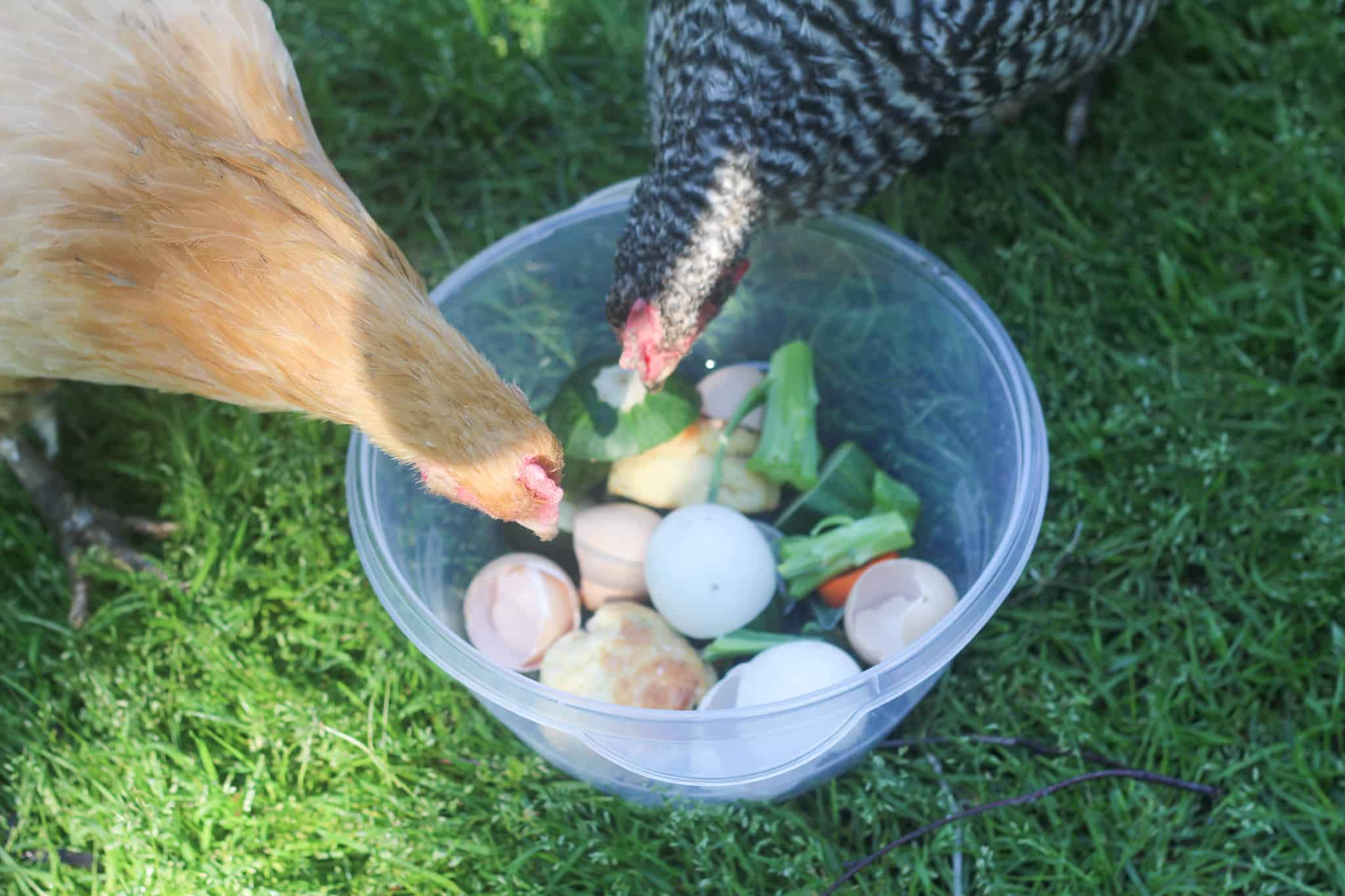Are you curious what scraps your chickens can enjoy? If so, this guide is perfect for you! As a chicken owner, it is important to know what scraps your chickens can eat and what should be avoided. This guide will provide you with all the information you need to ensure your chickens are getting the right nutrition. From kitchen scraps to treats, find out what scraps your chickens can eat and make sure they are getting the best diet possible.
What Are Table Scraps?

Table scraps are leftover food from our meals that can be fed to chickens. It is a great way to reduce our food waste, while providing good nutrition for our feathered friends.
What Scraps Can Chickens Eat?
- Vegetables: Chickens can eat most vegetables, such as lettuce, spinach, carrots, and celery. Avoid feeding them potatoes, onions, and garlic as these can be toxic to them.
- Fruits: Chickens can eat many fruits, including apples, oranges, bananas, and watermelon. Avoid feeding them grapes, raisins, and avocados as these can also be toxic to them.
- Grains: Chickens can eat whole grains such as wheat, oats, and barley. Cooked grains such as rice and quinoa are also safe for chickens to eat.
- Meat: Cooked meats such as chicken, beef, and fish are safe for chickens to eat. Avoid feeding them raw meat, as it can contain harmful bacteria.
- Eggs: Cooked eggs are safe for chickens to eat. Avoid feeding them raw eggs, as this can cause a deficiency of biotin, which can lead to health problems.
- Dairy: Cooked dairy products such as cheese and yogurt are safe for chickens to eat. Avoid feeding them raw dairy, as it can contain harmful bacteria.
Table scraps can be a great way to provide variety in your chickens’ diet, while reducing food waste. However, it is important to remember that table scraps should not make up more than 10-20% of their diet. The majority of their diet should still be made up of a good quality chicken feed.
Benefits of Feeding Scraps to Chickens
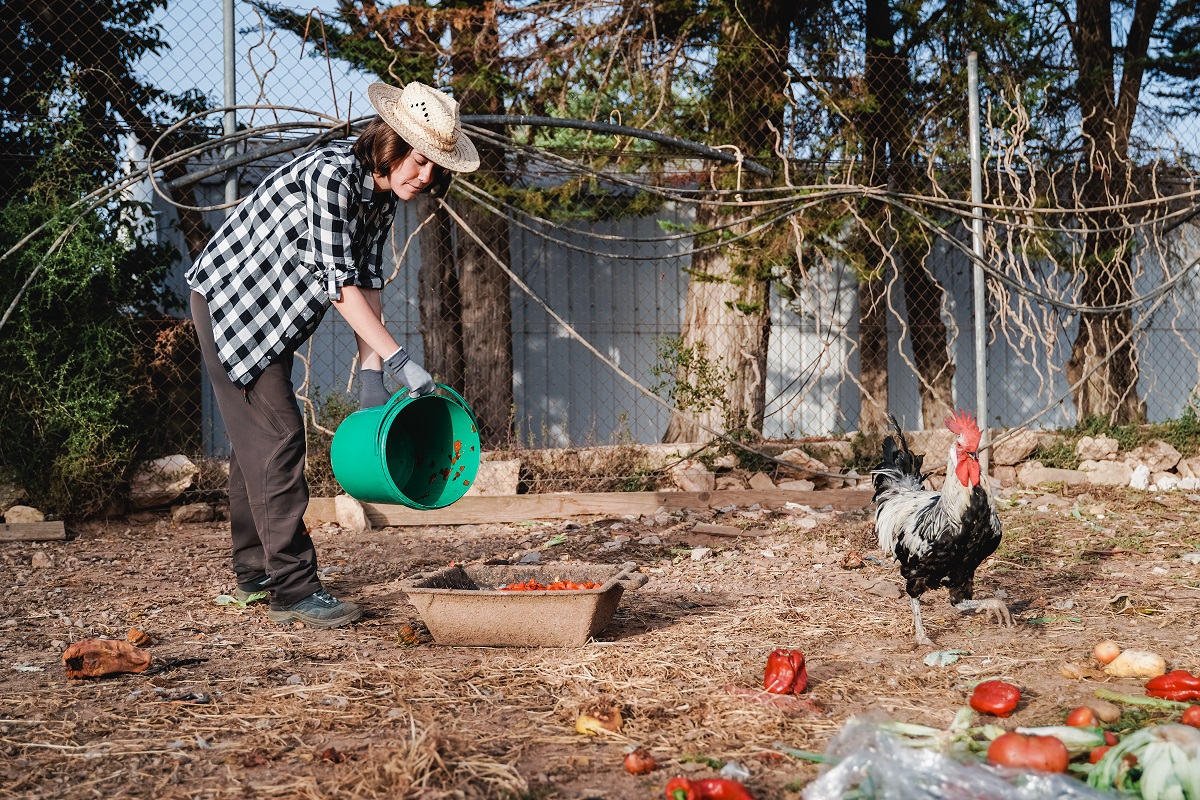
Chickens can eat a variety of table scraps, such as fruits, vegetables, cooked grains, and cooked meats. Feeding them these scraps can provide them with essential vitamins and minerals that they may not get from their regular feed. In addition, this type of feeding can help reduce the amount of waste in your kitchen, as well as reducing the cost of buying feed.
Nutrition: The scraps you feed your chickens will depend on what is available, but some good sources of nutrition include fruits and vegetables, cooked grains, and cooked meats. Fruits and vegetables provide vitamins, minerals, and other essential nutrients. Cooked grains and meats can help provide protein and energy.
Cost savings: Feeding scraps to your chickens can be a cost-effective way to provide them with nutrition, as you won’t need to buy feed for them. This could potentially save you money in the long-term.
Reducing food waste: By feeding table scraps to your chickens, you can help reduce the amount of food waste in your kitchen. Scraps that may have otherwise been thrown away can be put to good use by providing nutrition for your chickens.
Animal welfare: Feeding scraps to your chickens can also help ensure that they are getting the nutrition they need. This can help to improve their overall health and wellbeing.
Can chickens eat table scraps?: Yes, chickens can eat a variety of table scraps, such as fruits, vegetables, cooked grains, and cooked meats. However, it is important to ensure that any scraps you feed them are safe and healthy for them to consume.
Guidelines for Feeding Table Scraps to Chickens
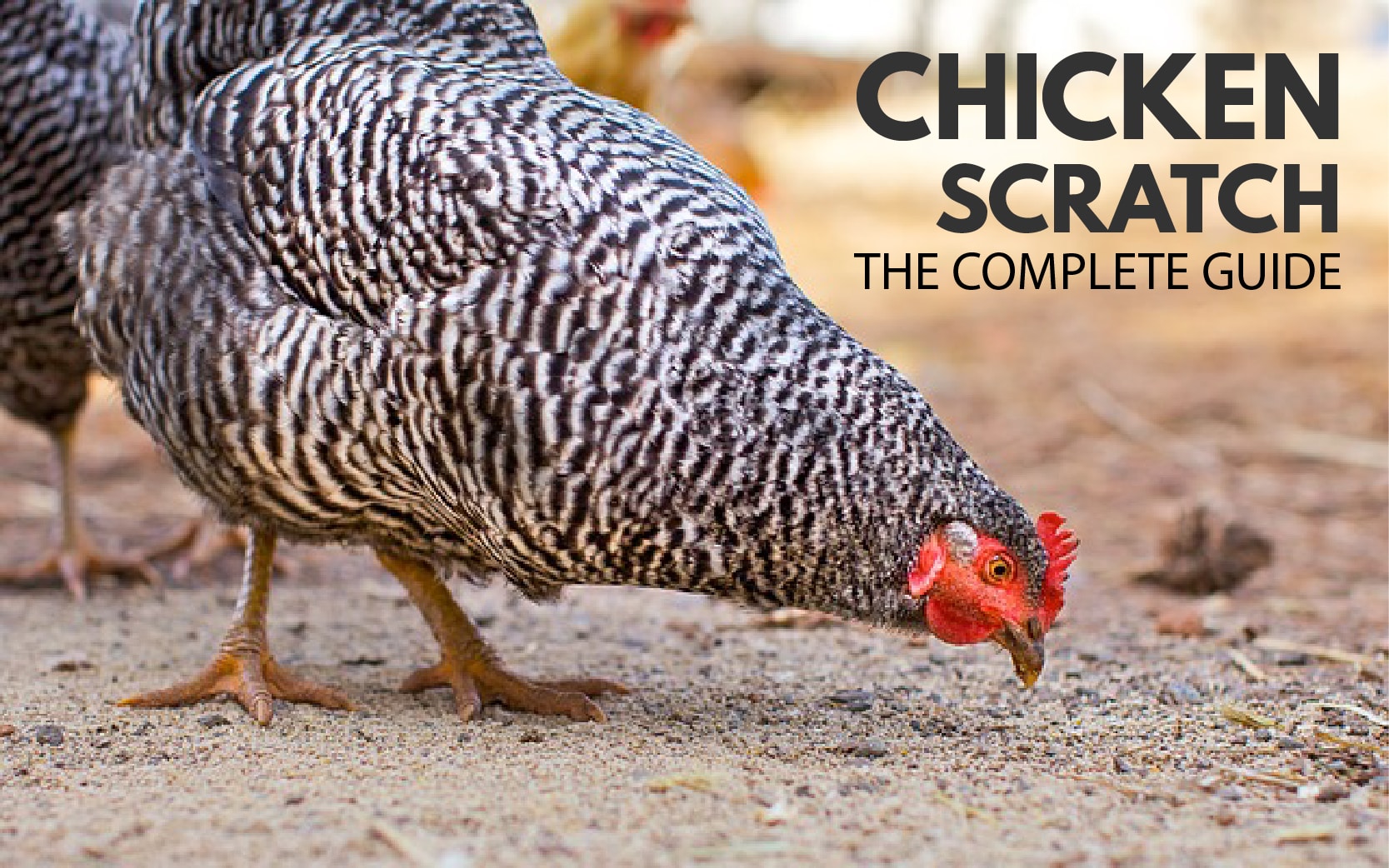
What Scraps Should You Avoid Feeding to Chickens?
Chickens should not be fed scraps that are high in fat, salt, or sugar such as potato chips, greasy meats, or candy. Additionally, raw beans, potato peels, and other foods high in anti-nutrients should be avoided.
How Often Should You Feed Table Scraps to Chickens?
Table scraps should generally be given to your chickens only occasionally; no more than 10% of their diet should consist of scraps. When you do give your chickens scraps, be sure to give them a variety of foods. This will help ensure that your chickens get all the nutrients necessary for a balanced diet.
Finally, it is important to be aware of what foods you are giving your chickens. Some foods, such as citrus or avocados, can be toxic to chickens, so it is best to avoid feeding these. In general, only give your chickens scraps when you can guarantee the food is safe and healthy for them.
What Are Some Common Table Scraps That Chickens Can Enjoy?
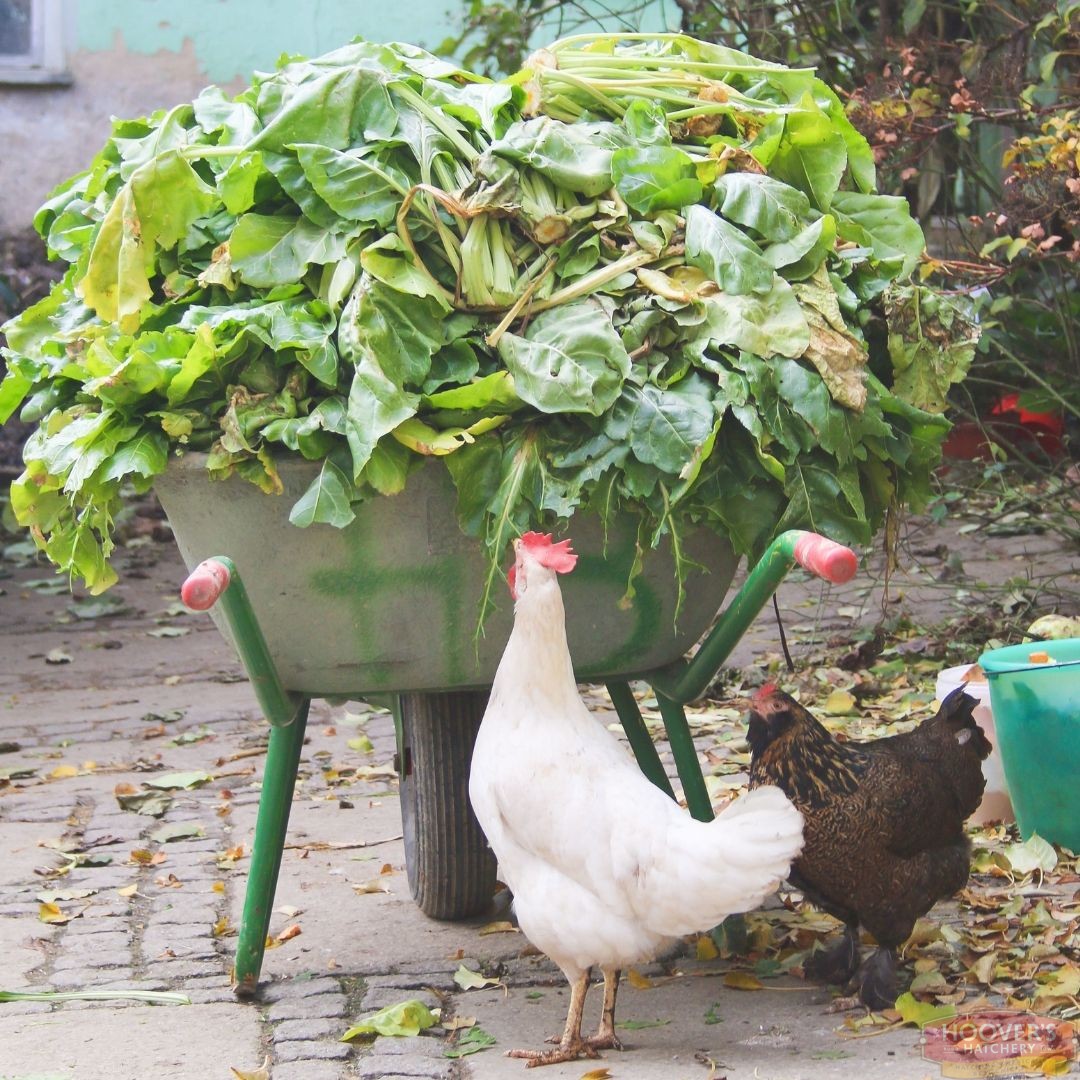
Fruits
Chickens can enjoy a variety of fruits, including apples, oranges, pears, and berries. If feeding them peels or cores, make sure to cut them into small pieces and remove any seeds.
Vegetables
Carrots, broccoli, cauliflower, and squash are all excellent sources of nutrition and can be fed to chickens in small pieces. Avoid feeding them potatoes, as they are difficult to digest.
Meat
Small amounts of cooked meat can be a great treat for chickens, although it should not be the primary source of their diet. Avoid giving them raw meat, as it can contain bacteria that is harmful to chickens.
Dairy Products
Cheese, yogurt, and other dairy products can be fed to chickens in small quantities. The high fat content of dairy products can cause digestive issues in some chickens, so it’s best to monitor their intake.
Grains
Grains, such as oats, wheat, and corn, can be fed to chickens in moderation. Avoid giving them large amounts of processed grains, as they can be difficult to digest.
Spices
Chickens can enjoy a variety of spices, such as garlic, oregano, and basil. However, it’s best to avoid giving them spicy seasonings, as they can be too strong for the chickens’ delicate digestive systems.
In conclusion, it’s important to remember that while chickens can enjoy many types of table scraps, it’s important to monitor their intake. Too much of some foods can cause digestive issues and may even be harmful to their health. To ensure that your chickens stay healthy and happy, make sure to provide them with a balanced diet of fresh fruits and vegetables, grains, and occasional treats of table scraps.
Other Benefits of Feeding Scraps to Chickens
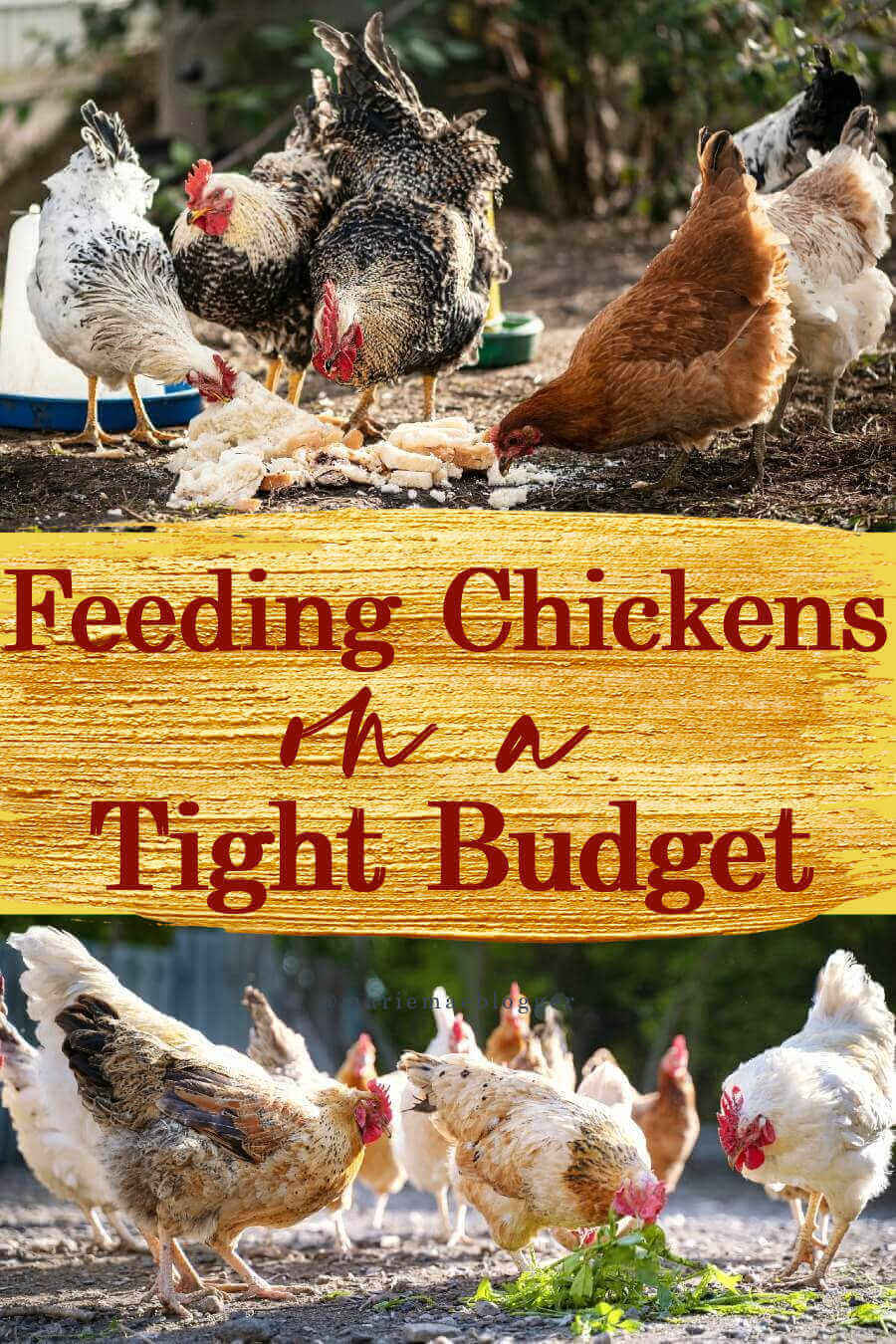
Cost savings: Feeding scraps to chickens can save a lot of money. Most scraps, such as vegetable and fruit peels, are free. Plus, you don’t need to buy as much commercial feed if you supplement with scraps.
Nutrient diversity: Scraps can add a lot of variety to a chicken’s diet. This can help provide a more balanced and healthy diet.
Waste reduction: Feeding scraps to chickens is a great way to reduce household waste. This can help reduce your environmental footprint.
More natural diet: Scraps can provide a much more natural diet for chickens. This can help them live healthier and happier lives.
Cleaner coop: When chickens are fed scraps, there is less of a need for commercial feed. This can result in a cleaner coop since there is less mess from spilled feed.
More eggs: Feeding scraps to chickens can result in more eggs being laid. This is because they are receiving more of the essential nutrients that they need.
When can chickens eat scraps? Chickens can eat most scraps, including vegetable and fruit peels, bread, cooked rice, and oats. However, it is important to avoid giving them anything that is potentially dangerous, such as onions, garlic, and avocado.
Safety Precautions to Follow When Feeding Scraps to Chickens
- Store all food scraps in a cool, dry, and pest-free environment. Be sure to keep the container sealed and away from direct sunlight. Doing this will help prevent the growth of mold, bacteria, and other potentially dangerous microorganisms.
- Do not feed your chickens spoiled food. Spoiled food can contain harmful bacteria and toxins that can make your chickens sick. Always check food before feeding it to your chickens to ensure it is not spoiled.
- Do not feed your chickens raw meat. Raw meat can contain harmful bacteria that can make your chickens sick. If you want to give your chickens meat, cook it thoroughly first.
- Do not feed your chickens large amounts of starch or sugar. Too much of these can lead to obesity and other health issues for your chickens.
- Do not feed your chickens food with a lot of salt. Too much salt can be dangerous for your chickens and can even lead to death.
- Do not feed your chickens food scraps that contain toxic chemicals. These can be found in things like paint, glue, and cleaners. These substances can be very harmful to your chickens and can even be fatal.
By following these safety precautions, you can ensure that your chickens are getting the most out of the food scraps you provide them. Additionally, it will help keep your chickens healthy and free from any potential illnesses. From fruits and vegetables to grains and proteins, there are many food scraps that your chickens can enjoy. Just be sure to follow the safety precautions listed above to keep your chickens safe and healthy.
Frequently Asked Questions
What is the Best Way to Feed Chickens Scraps?
Scraps are an excellent source of nutrition for chickens and should be included in their diet. The best way to feed chickens scraps is to offer them in moderation and in small, bite-sized pieces. Chickens may prefer some scraps over others, so offer a variety of options to see which they enjoy the most. Table scraps, fruits, vegetables, and cooked grains are all suitable for chickens. When feeding chickens scraps, make sure to avoid any foods that are high in fat, salt, or sugar as these can be harmful to their health. Additionally, always ensure that the scraps are free from any mold or spoiled food.
How Often Should I Feed My Chickens Scraps?
Chickens should be fed scraps no more than once a day, and it is best to ensure that the scraps are safe for them. Fresh fruits and vegetables should be washed, and cooked scraps should be cooled before feeding. Avoid feeding chickens anything processed or high in fat or salt, and grains such as corn or barley should be fed in moderation. Furthermore, moldy or spoiled scraps should never be fed to chickens.
Are there any foods I should avoid feeding to my chickens?
Chickens should not be fed avocados, chocolate, green potatoes, or rhubarb as these can be toxic. Citrus fruits, such as oranges, should also be avoided as chickens have difficulty digesting them. Moldy or spoiled food should also not be fed to chickens, as it can lead to digestive issues and even death. Raw or undercooked beans, peanuts, and other legumes should also be avoided.
Are there any health benefits to feeding my chickens scraps?
Yes, there are health benefits associated with feeding your chickens scraps. The added nutrition in scrap food can help strengthen your chickens’ immune systems and allow them to fight off disease. Additionally, providing variety in their diet is beneficial to their digestion and overall health, as it helps to keep their intestines functioning properly. Scraps can also provide extra energy and protein, which is essential for chickens’ growth and development.
How can I tell if my chickens are getting enough nutrition from scraps?
1. Monitor egg production: Regular egg production is a good sign that your chickens are getting the nutrition they need. If your chickens’ egg production drops suddenly, check to see if you are providing enough nutrition in the form of scraps.
2. Check their weight: Healthy chickens are a good weight, neither too skinny nor too fat. If you notice that your chickens are losing weight or appear too thin, consider supplementing their diet with more nutrient-rich scraps or additional feed.
3. Look for signs of deficiency: If you notice your chickens scratching more than usual, have poor feather quality, or look unwell, they may not be getting sufficient nutrition. This could be an indication that you need to increase the variety and quantity of scraps you provide.
4. Observe your chickens: Pay attention to your chickens’ behaviour. Are they alert and energetic, or lethargic and inactive? Are they eating their scraps eagerly, or leaving them untouched? If you notice any changes in their behaviour, this could be a sign that they are not getting enough nutrition.
5. Check their droppings: Healthy chickens will produce droppings that are firm and well formed. If their droppings are loose or runny, this could be a sign that they are not getting enough nutrition from their scraps.
Conclusion
Chickens are omnivores and need a balanced diet to thrive. While they enjoy the occasional scrap, it is important to provide them with a balanced diet that includes a variety of proteins, grains, fruits, and vegetables. With regular exercise, access to fresh water, and a safe housing environment, chickens can live long and healthy lives.
